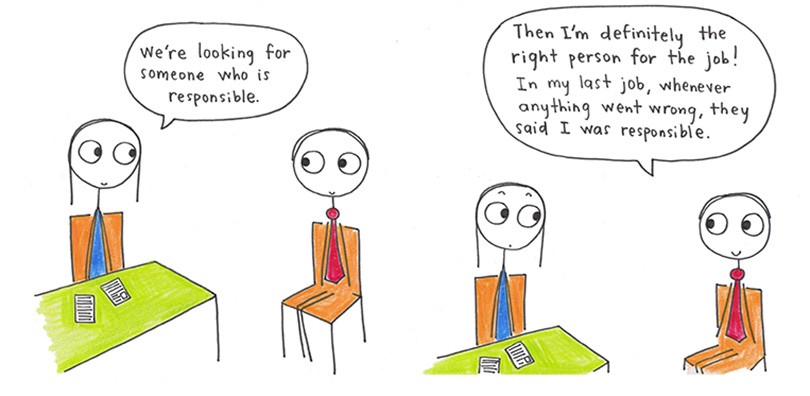Good Interview Questions Top C-Level Execs Use
Interviewing a candidate is never an easy task. You can either become a fan of someone who has a charming personality but isn’t quite right for the role, or conversely -- skip over a stellar candidate, who does not perform well when touting her accomplishments.
For a hiring manager or recruiter, figuring out good interview questions to ask can make all the difference. But the ability to whittle down a list of the very best interview questions often comes with years of experience.
Fortunately, many C-level executives have already shared some of their favorite interview questions for the rest of us to learn from. Here are a few original and provocative interview questions they use and that can help steer you toward the candidates who are passionate and committed to their work.
1. Let’s assume we both decide to move forward and you have been on the job for three months. After 90 days one or both of us decide it isn’t going to work. What is the most likely reason this happened?
Why ask: This is a favorite question of Aaron Hurst, CEO of Imperative and author of “The Purpose Economy.” According to Hurst this question is a great way to get someone to share their own weaknesses, because in order to answer they will have to talk candidly about what has gone wrong in the past or might go wrong in the future.
2. I've interviewed an eclectic crowd about you: the guy who delivers your food, the last people you worked with, the person who can't stand you the most, your best friend from high school, your mother's neighbor, your kindergarten teacher, your high school math teacher who loved you, and your last boss. If I were to say to them, 'Give me three adjectives that best describe you,' what would I hear?"
Why ask: Michelle Peluso, CEO of Gilt Groupe suggests asking this question because it usually catches candidates off guard, and they won’t be able to just use a canned statement. Instead they’ll have to consider the opinions of so many different people they interact with in their daily lives and give a 3D picture of their personality.
3. Tell me about your past review, and what did your boss say were the areas you excelled and the areas you needed to improve?
Why Ask: Robert Reid — The CEO of Intacct Corporation likes to ask this question to reveal the professional strengths and weaknesses of the candidate in a relatively objective way. The candidate’s answer will likely reveal challenge areas where they may need extra support.
4. How old were you when you had your first paying job?
Why ask: The President of Paramore Advertising Agency, Hannah Paramore, asks this question to get at someone’s work ethic. She feels that people who had to work part time in high school or in college often have a larger sense of personal responsibility. If you are looking for somebody with such traits, this would be a good question to ask.
5. If you could say any one of these things about your career, which would it be?” “I was a pre-I.P.O. employee at Google,” or “I was a 20-year veteran of IBM,” or “I mastered the four-hour workweek,” or “I was on the Apollo 13 team.
Why ask: Swipely CEO, Angus Davis, asks this question because he’s looking for the candidate who answers “Apollo 13,” and shows preference for working in teams. If the candidate picks “pre-I.P.O. google,” they’re showing that their primarily driven by money. You can infer what the rest of the options mean or substitute them with ideas of your own.
6. What single project or task would you consider the most significant accomplishment in your career so far?
Why ask: Lou Adler, CEO of the Lou Adler Group, touts this as the best interview question one can ask. According to him, once the candidate answers, the interviewer can spend at least 20 minutes asking follow-up questions to understand better the candidate's accomplishment as well as the person's the work ethic, analytical thinking and drive to produce results. Good follow-up questions are “What were the actual results of the accomplishment?” “Why were you given this role?” “What would you do differently next time?” and so on.
7. What concerns do you have about our company?
Why ask: Dharmesh Shah, the Founder and CTO at HubSpot, puts a lot of faith in this question because he says it reveals those candidates who are willing to talk openly and honestly about their concerns. A good candidate has done their research and knows that your company isn’t perfect because no company is perfect, he shares. This question allows an interviewer to see how transparent they will be as an employee.
8. What's the best and worst career advice you've been given in your career?
Why ask: For Marc Cendella, CEO of The Ladders, this question get to the heart of what’s most important to a candidate. When they talk about the best advice they’ve ever got, their answers usually reveal what’s most important to them. When they talk about bad advice, he says, their answer should sound authentic, because everyone gets bad advice and makes bad decisions, and it’s important to be willing to be honest about it.
photo source: thedailyenglishshow.com
Topics: Interview questions
Related articles




